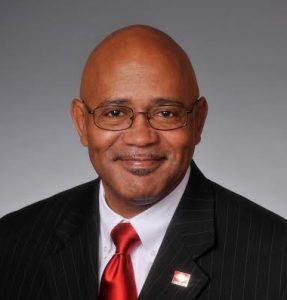Democratic lawmaker, county judge reportedly admits to taking $100,000 bribe
by March 19, 2018 6:03 pm 789 views

Another state lawmaker has been caught up in a broadening federal investigation that has overshadowed the Arkansas General Assembly for more than a year over the handling of so-called GIF, or General Improvement Funds.
Arkansas Democratic Chairman Michael John Gray on Monday (March 19) called for the immediate resignation of former Arkansas lawmaker Rep. Hank Wilkins of Pine Bluff after the Arkansas Democrat-Gazette reported this weekend that the former Democratic lawmaker had taken a $100,000 bribe from indicted lobbyist Milton Russell “Rusty” Cranford of Rogers. Wilkins serves as the Jefferson County Judge. He previously announced he will not seek re-election.
“What we’ve seen come out about Hank Wilkins is unfortunate and frustrating. And it gets to the heart of the issue of corruption in the political scene. For instance, take the General Improvement Fund, which was intended for lawmakers – especially those in rural communities – who know their areas best, to provide necessary funds to their schools, fire departments, and other vital community services,” Gray said in a statement. “Any lawmaker, regardless of party, that has been found misusing GIF funds or taking part in kickback or bribery schemes should resign immediately.”
Wilkins represented House District 17 from January 2011 to 2015. Before term limits, he previously served in the General Assembly from 2001 to 2011, first in the Arkansas Senate in the District 5 and 8 seats, and the final two years in the state House of Representatives.
According to the Democrat-Gazette report on March 17 (Saturday), Wilkins made the stunning admission he accepted the $100,000 bribe in a Feb. 22 statement to the FBI.
That same day, Cranford was arrested on corruption charges in an alleged scheme in which executives for a Springfield, Mo.-based Preferred Family Healthcare paid bribes through his lobbying firm to obtain state grants and other taxpayer money.

Assistant U.S. Attorney Steven Mohlhenrich had asked that Cranford be denied bail, citing an alleged plot by Cranford to murder one witness and convince others to lie to investigators. Cranford had recently tried to influence Wilkins in that manner, Mohlhenrich said during the hearing, the Democrat-Gazette reported. The article stated that Mohlhenrich told U.S. Magistrate David Rush that Wilkins told the FBI that donations made by Cranford to his church in Pine Bluff were in fact bribes for Wilkins’ support as a state lawmaker from 2011 to 2015.
In Mohlhenrich’s motion to detain Cranford, the 27-page filing states “clear and convincing evidence establishes there is a serious risk Cranford will obstruct justice, threaten, injure, and intimidate witnesses.” The court filing further states that Cranford has attempted to obstruct the federal probe by urging prospective witnesses against him to provide false information to investigators.
“When Cranford’s prior attempt to tamper with one witness proved unsuccessful in January 2018, Cranford requested the assistance of another individual to murder that witness, in exchange for which he offered to pay that person a large sum of money and provide a gun, and gave that person $500 as an initial payment in that endeavor …”
At the time of his arrest, the court filing states, Cranford “possessed a 45-caliber derringer-style pistol, which was still in the box, and had in his backpack a large sum of cash, specifically, $17,700.00, all in one-hundred-dollar bills.”
On Feb. 21, Talk Business & Politics reported that Cranford, 56, had been indicted by a federal grand jury for his role in a nearly $1 million bribery conspiracy involving the Springfield health care nonprofit.
According to Timothy Garrison, U.S. Attorney for the Western District of Missouri, Cranford was charged in a nine-count indictment returned under seal by a federal grand jury in Springfield, Mo. That indictment was unsealed and made public after the longtime lobbyist was arrested. Cranford’s initial court appearance on those charges took place at a Feb. 22 hearing at the U.S. District Court in Fayetteville, the same day Wilkins first made his admission to the FBI. Garrison has cautioned the charges contained in Cranford’s indictment are accusations, and not evidence of guilt. Evidence supporting the charges must be presented during a federal trial jury, whose duty is to determine guilt or innocence.
Ten days before his admission in federal court, Wilkins also made the surprise announcement he would not seek re-election as Jefferson County Judge in 2018. He said his decision to resign was because of “opportunities in the private sector.” A person answering calls at Wilkins’ Jefferson County office said Wilkins was not available on Monday afternoon. Media reports said Wilkins sent a letter of resignation to Gov. Asa Hutchinson, but that letter was not yet in the governor’s hands.
“We have not received it yet,” said Hutchinson spokesman J.R. Davis, adding the governor would not comment until he received confirmation that Wilkins had stepped down.
GIF PROBLEMS
The longtime Democratic icon is the latest state lawmaker caught up in the broadening federal investigation that has overshadowed the General Assembly.
On Feb. 12, former Rep. Eddie Wayne Cooper, D-Melbourne, pleaded guilty in federal court for his role in a conspiracy to embezzle more than $4 million from a Springfield, Mo.-based health care charity. Cooper’s guilty plea came only weeks after Sen. Jake Files, R-Fort Smith, pleaded guilty to one count of wire fraud, one count of money laundering and one count of bank fraud, with part of the activity including use of GIF funds.
General Improvement Funds were also at the root of another investigation a year ago involving former Sen. Jon Woods and former Rep. Micah Neal, both Republicans from Springdale. Neal confessed to a kickback scheme involving GIF money, while Woods is fighting the charges.
House Speaker-elect, Rep. Matthew Shepherd, R-El Dorado, said last week there is still concern in the legislature about the ongoing federal probe, saying lawmakers will have to continue to build trust with voters because of a few lawmakers who chose to denigrate the body.
“In light of all that has happened over the past year, that is obviously something that … has been a stain on the General Assembly,” he said. “It is important for us to set a high standard of conduct to try and rebuild the public trust and confidence in the institution. … This is a great institution and there’s so many great people, and it’s unfortunate that a few can tarnish the reputations of so many. But that’s where we find ourselves.”
